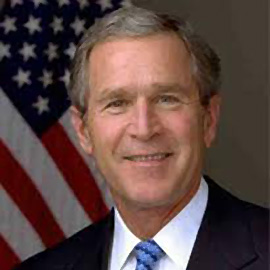
A president’s personality can have a powerful effect on the policies he chooses to pursue, according to UConn political scientist Stephen Dyson, who recently published an article in Political Science Quarterly about George W. Bush and the surge in Iraq.
The paper, titled “George W. Bush, The Surge and Presidential Leadership,” examines the former president’s personality and how it influenced his decision-making when it came to changing course in Iraq in 2007.
At the time, many felt that a major change was needed in the Iraq war strategy, yet Bush’s “cognitive closed style” delayed a strategy shift, he says. But it was in keeping with Bush’s personality that when he did accept that a change was necessary in light of stalled or ebbing U.S. progress in Iraq, he chose to escalate the war.
“Things had deteriorated to the point that there was overwhelming pressure to withdraw,” says Dyson. “Then – amazingly – Bush not only changed course, but did so in a way that flew totally in the face of the consensus view. And it worked, and that will be an important part of the president’s legacy when historians look back.
“I’m fascinated by ‘moments of decision’ when individuals quiet the querulous course of history with acts of will,” says Dyson. “Bush as a president had a lot of faults, but the fascinating thing with the surge is it was precisely those faults that led him to make the correct decision.”
The core of the paper is simple: no Bush equals no surge. “No one else would have done it,” Dyson says.
Dyson, an assistant professor of political science in the College of Liberal Arts and Sciences, specializes in research on the psychology of elite decision-making in foreign policy. He has also published articles on former Secretary of Defense Donald Rumsfeld, and former British Prime Ministers Tony Blair and Margaret Thatcher, and a book: The Blair Identity: Leadership and Foreign Policy (Manchester University Press, 2009).
“I think the overall message of the research is that we academics should be humble about our grand theorizing and our elegant models,” he says. “Individuals still make the big decisions, and the idiosyncrasies of a president’s style and approach to the world really drive politics in ways that social scientists can’t wish away, however much of a challenge they pose to our ambitions to turn political science into physics.”
To better understand such a personal topic, Dyson used many research methods to generate his findings. He talked to people who knew the president and had worked for him, and also combed through the literature on Bush’s style and how he approached the job. “Individual personality is such a hard thing to measure,” he says, “that it seems best to use multiple methods.”

